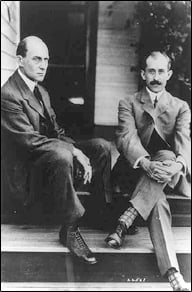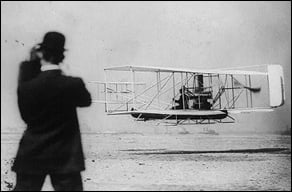|
Inventing
the Plane
by Kate Reuther
 |
 |
 |
| The Wright brothers were the first to invent a working airplane. |
 |
A hundred years
ago, most people thought that human beings would never fly. How
could people fly without wings? The whole idea of flying seemed
crazy and dangerous. Yet a new century was dawning and with it,
a new world full of new discoveries. It was a time where everyone
was trying to break the old limits and boundaries. So many inventors,
including Orville and Wilbur Wright, tried to invent a flying machine.
Most airplane
inventors at the time were impulsive and disorganized; they would
think of an idea, build a plane as quickly as they could, and then
try to fly it as soon as possible. Some people tried strapping wings
to their arms. Other inventors created planes that looked like giant
bouncing umbrellas. As you can probably guess, most of these planes
crashed immediately. The inventors would carry home their broken
plane, having no idea why it didn't work.
The Wright brothers
were much more scientific and methodical inventors. They believed
in testing their ideas in smaller or safer versions before building
an actual plane. Scientists today, like the Wright brothers, don't
just build things and see what happens; they make observations,
then form a hypothesis or guess, and then do more tests to see if
their hypothesis is correct. This is known as the "scientific
method." For example, the Wright brothers built a wind tunnel
to compare wing shape ideas By attaching an old shop fan to a 6-foot-long
wooden box, they could blow "wind" on hundreds of different
miniature wings and measure with a scale exactly how much lift each
wing produced. The Wright brothers also flew countless kites as
well as motor-less gliders to test their designs. They studied the
way birds move through the air and tried to duplicate it with their
models. Throughout all their experiments, Orville and Wilbur took
careful notes and measurements so they could analyze what worked
and what didn't.
 |
 |
 |
| An early photograph of the Wright brothers working together in their bike shop. |
 |
Eventually,
the Wright brothers felt they were ready to test their planes, but
they needed to find the right spot. They wrote for help to the U.S.
Weather Bureau, who told them that Kitty Hawk, North Carolina would
make a perfect test site because of its high winds, its hilly terrain,
and its sandy dunes (in case of crash landings). In 1900, 1901,
and 1902, Orville and Wilbur tested increasingly bigger and more
effective gliders. A glider is like a plane except that it has no
motor and depends on the wind to propel it. Based on their results,
they added a movable tail, dual propellers, wing-warping wires
(for steering), and a gasoline-powered motor to their design.
Finally on December
17th, 1903, Orville and Wilbur assembled their most ambitious plane,
nicknamed the "Flyer I," on the sand on Kitty Hawk.
Flyer I weighed over 600 pounds and had an impressive wingspan of
40 feet. With winter coming, the Wright brothers knew that they
had to get this test right, or else they would have to wait for
many, many months of bad weather before they could try again. The
brothers flipped a coin to see who would be the first pilot. Orville
won. With his brother at the controls, Wilbur pushed the plane down
the short wooden ramp and it lifted into the air. Flyer I remained
airborne for twelve seconds and it traveled just 120 feet, but Orville
and Wilbur were ecstatic. Their plane really worked! By the end
of the day, both brothers had made successful flights, with Wilbur
covering a record 852 feet in 59 seconds. The Wright brothers left
Kitty Hawk that day having done the impossible.
 |
 |
 |
| One of the few photographs of Orville's first flight on December 17th, 1903. |
 |
However, the
Wright brothers were not satisfied with Flyer I. They went back
to their shop and over the next two years constructed the Flyer II and
then the Flyer III, which proved to be a much more reliable airplane
than the original flyer. On October 5th, 1905, Wilbur set an endurance
record in the Flyer III, flying over 34 miles in 38 minutes. In
1909, the Wright brothers formed the American Wright Company to
manufacture airplanes for the US military. The brothers continued
to experiment and modify their design until 1912, when Wilbur died
of typhoid fever.
|

